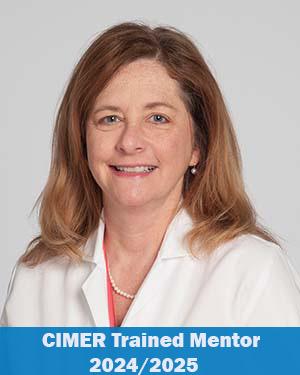Research News
11/07/2024
Dr. Ruth Keri recognized by NIH for commitment to DEIA mentorship in STEM
For her contributions to promoting DEIA in research, Dr. Keri received a research supplement she will use to support minorities and women in research.

Cleveland Clinic’s Ruth Keri, PhD, was recently recognized by the National Institutes of Health with the Administrative Supplement to Recognize Excellence in Diversity, Equity, Inclusion, and Accessibility (DEIA) Mentorship. The award, which will support her lab’s treatment-resistant breast cancer research, recognizes her track record of building programs that offer resources and connection for early-career scientists and trainees from historically underrepresented groups.
Dr. Keri leads a Cancer Biology lab and serves as associate director for basic research at Case Western Reserve University’s Comprehensive Cancer Center. Through these institutions, Dr. Keri has spearheaded training programs to provide opportunities to individuals of all backgrounds, races, ethnicities, religions and sexualities, and give them the tools they need to excel in their careers.
"I try to be very creative and deliberate about ways to improve diversity in research,” she says. “We all agree it's important, but you need to be intentional about it and make sure you're making a long-term commitment - this isn't something that's going to change overnight."
As a first-generation college student from a poor community in rural Appalachia, Dr. Keri was supported by multiple grants, scholarships and outstanding mentors throughout her education and training. Of the 46 trainees that she has directly mentored over the past 10 years, ranging from high school students to postdoctoral researchers, 78% identify as female and 43% are from underrepresented backgrounds (as defined by NIH).
“Now that I am an established scientist, I have a duty to pay it forward to support the next generation of disadvantaged and underrepresented individuals in STEM,” Dr. Keri says.
Dr. Keri will use her supplement to fund a research project conducted by three trainees in her lab: Mary Vincent, a graduate student earning her doctorate in Lerner Research Institute’s Molecular Medicine program; Parth Majmudar, a CWRU graduate student finishing up a PhD in pharmacology; and Saul Castillo, an undergraduate research student earning his bachelor’s degree at CWRU.
The three researchers are using a combination of computational and experimental techniques to determine which cells in a triple-negative breast cancer tumor express a gene called YES1. Previous Keri Lab research has shown that blocking this gene and its resultant protein can make treatment-resistant tumors susceptible to therapy again, but not every cell in a tumor turns that gene “on” at the same time.
As a mentor, Dr. Keri tries to make sure her trainees are competent in “wet” and “dry” lab – experimental work in a tube and analytical work at the computer, respectively. She will use a portion of her supplemental funding to support extra training programs for her students, with the goal of those students passing down that knowledge.
Dr. Keri has supported Majmudar’s transition into a computational biologist during his doctorate training, so his thesis project has a hybrid of wet and dry approaches. He learned to computationally analyze gene expression data from colleagues in the Breast Cancer Center of Excellence. He is sharing this knowledge with Vincent and Castillo.
"Growing up, I was always drawn to technology and computers, even as I avidly pursued science,” Majmudar says. “I am incredibly thankful that my graduate education coincided with the rise of more advanced sequencing technology that have allowed me to realize my passion and skill for computational analyses and combine it with my biological knowledge for the future benefit of patients."
Dr. Keri encouraged Castillo to participate in a summer fellowship at the Dana-Farber Cancer Institute where he learned a technique called “spatial-omics” to analyze DNA and RNA in relation to the molecules’ physical location in a sample. Together, the team is establishing a pipeline for training individuals with experimental biology expertise in the utilization of large data sets.
“Being a part of the Keri lab has given me the tools to make and test novel, clinically relevant hypotheses. But more importantly, having Ruth Keri as a mentor has given me the confidence to grow beyond my roles as a scientist,” Vincent says. “She inspires me and supports my efforts to become an active member of the scientific community, and to identify and meet community needs to make science a more accessible and equitable field.”
Featured Experts
News Category
Related News
Research areas
Want To Support Ground-Breaking Research at Cleveland Clinic?
Discover how you can help Cleveland Clinic save lives and continue to lead the transformation of healthcare.
Give to Cleveland Clinic